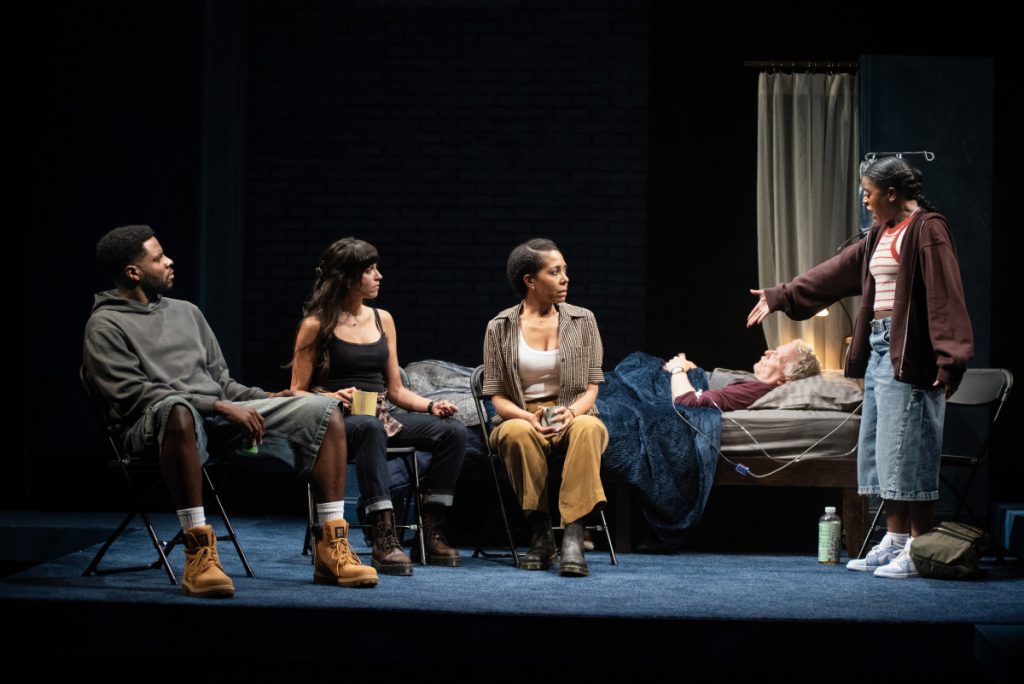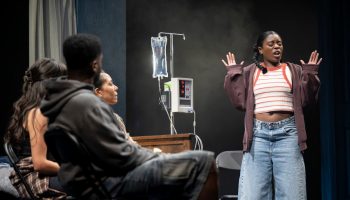
Julia Weber
Staff Writer
When we think of the apocalypse, we often think of survival. C.A. Johnson, however, challenges audiences not just to think of survival, but to think of living.
Johnson is the playwright behind The Witnesses, the third and final mainstage production of Chautauqua Theater Company’s 2025 season — which has its official opening at 6 p.m. tonight in Bratton Theater.
The Witnesses tells a tale of a community support group formed amid an apocalyptic plague ravaging a community. Commissioned by Producing Artistic Director Jade King Carroll in 2023, the play came to Bratton as a New Play Workshop last summer, then titled as Tell Me You’re Dying, and makes its world premiere tonight.
“I don’t write about where we come from — I write about where we land,” Johnson said.
Johnson said she frequently finds herself thinking about what that means, specifically for female leads. Often, she is concerned with understanding what it means for women to “find love and love with their whole hearts without fear.”
For Johnson, The Witnesses is specifically an exploration of love when the guardrails of society are removed. She said she is interested in understanding how we, as a culture, find love and community amid dire situations.
“If we look at a version of the world that is like ours but also dying, is an audience then able to more closely look at how they are living in their actual lives?” Johnson asked.
The Witnesses dramaturg Otis Ramsey-Zöe said working with Johnson is a beneficial experience and one that he doesn’t take for granted, because she trusts him “to listen to her work, to ask big questions about the connections that are showing up in the work.”
Ramsey-Zöe said he particularly enjoys working with Johnson because her writing holds a “remarkable complexity,” and he enjoys delving into the script and production to offer his dramaturgical observations to bring the play to its most elevated form.
When it comes to playwriting, Johnson said she is much more interested in exploring the question of how we live, as opposed to the question of how we survive.
“I’m so much more interested in how we live because living is a positive emotion,” she said. “When you look at the positive thing that comes with living, it makes you actually see what’s incongruous. Surviving is just battling — you’re just trying to stay afloat — living is a joyful, beautiful thing.”
In the play, the characters are faced with immense challenges and an increasingly depressing situation, but nonetheless, they choose to embrace love and community. Johnson said she believes the play speaks to the current state of the country and the state of relations between individuals.
“It’s just a lot of things that have me worried, and the one thing that gives me hope is that we can still choose to live,” she said. “We can still choose to move and love in positive ways, and I hope this play reminds people of that.”
Like Johnson, Ramsey-Zöe said The Witnesses can offer an understanding of how close communities can heal divides.
“When we allow ourselves to be in intimate proximity to one another, then we find ways to care about people,” Ramsey-Zöe said. “We don’t have to agree with them, but we do have to maybe see if we can practice being together. In being together, how can you be my enemy when we are standing side by side?”




